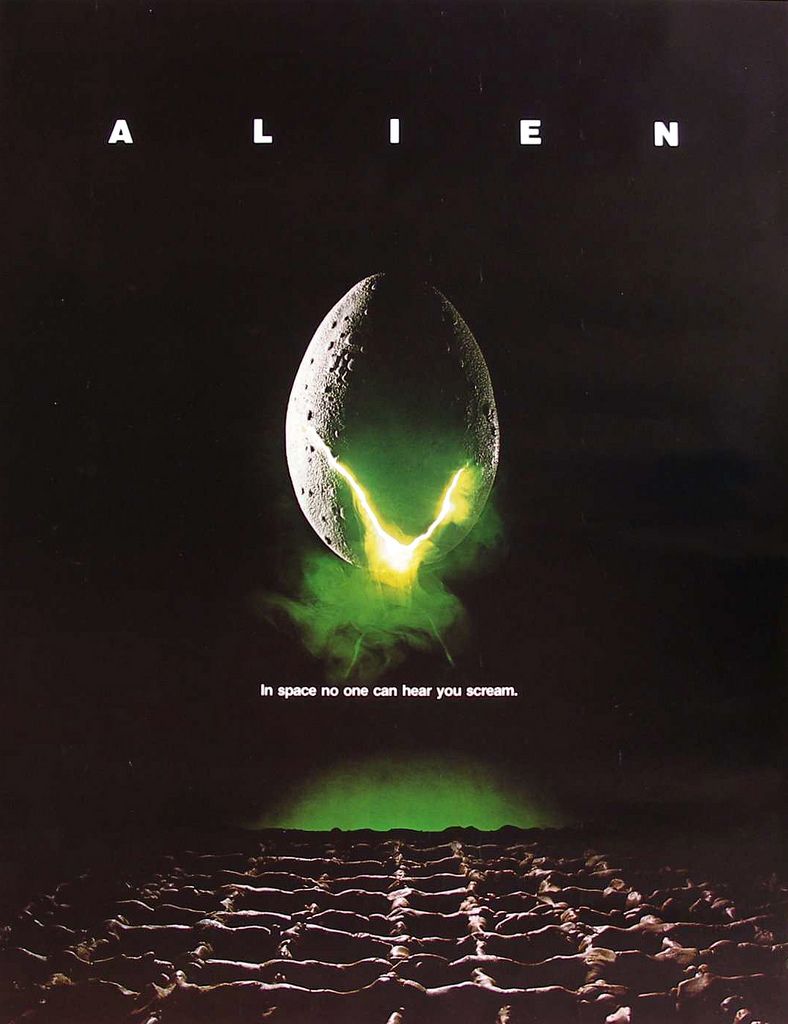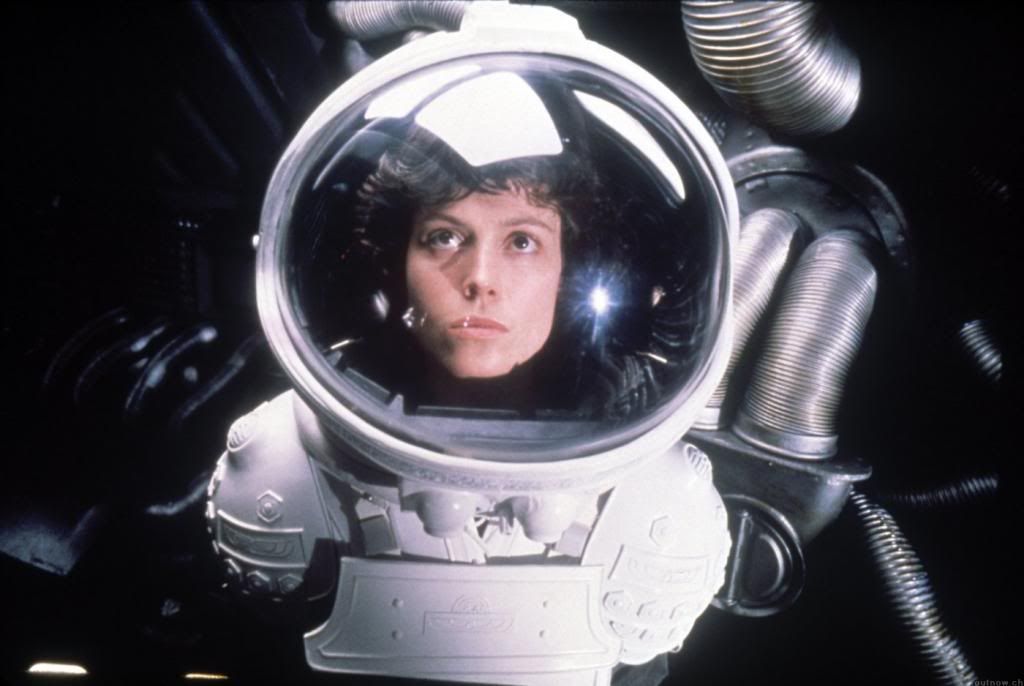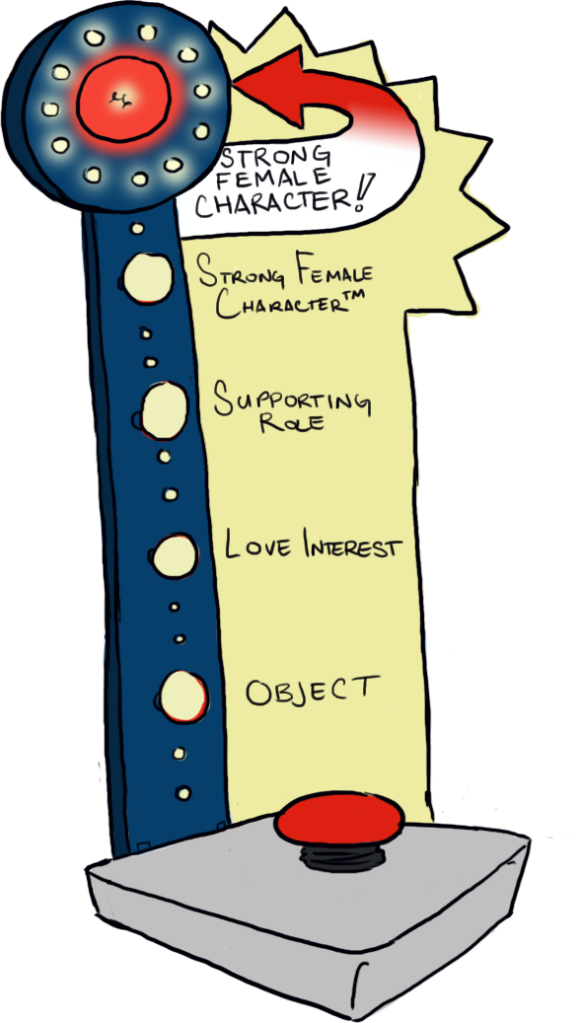(Note: For this analysis, I will be referring to the 2003 Director’s Cut of Alien.)
In
the past nine months, we’ve talked about a lot of characters. There are
some we’ve devoted whole posts to, while others were forced to share
space with one, two, or, in the case of the Disney mothers analysis, a
dozen or so other people. But there are some characters too big, too
important, and too iconic to be contained in one post. For that reason,
we’re introducing the Heavy Hitters, month-long discussions of the most
influential female characters in pop culture.
We begin with Lt. Ellen Ripley, who, in her debut in Alien,
is the third officer of the commercial towing vehicle Nostromo, the
sole survivor of said spaceship, and an all-around badass. For those who
have never seen the film, here’s a quick summary. The crew of the
Nostromo wakes up from cryogenic sleep only to find that the ship has
been re-routed far from its usual territory. Already a little thrown off
their game, the crew faces further strangeness when they receive a
transmission from a small planetoid that they assume to be an SOS. They
descend to the planetoid, where the scouting party discovers a ship full
of eggs; one hatches, and the creature inside attaches itself to the
face of the executive officer. Ignoring the company’s quarantine rules,
they bring the alien parasite onboard, where it bides its time before
emerging as a human-sized nightmare and killing everyone but Ripley, who
shoots it into space.
The
first significant point to discuss in terms of Ripley’s portrayal is
the fact that she was not originally intended to be a woman. In the
original script by Dan O’Bannon and Ronald Shusett, they specify that,
while the sole survivor, then called Martin Roby, was written as a man,
“the crew is unisex and all parts are interchangeable for men or women.”
Still, it’s a pretty safe bet that they weren’t planning to be part of
the genesis of one of the first female action heroes.
The
concept of ostensibly gender-neutral casting is something of a thorny
issue. Is a strong female character really a strong female character if
she was originally intended to be a man? Is there more to writing women
than merely taking a male character and having him be played by a woman
(the so-called “man with tits” writing method)? Can male writers write
female characters as complex people without initially envisioning them
as men? Is there such a thing as a major “unisex” role? Should there be?
What
I’m trying to get at is the simple fact that a person’s gender
necessarily affects the way they experience the social world around
them, and this is particularly true of Ellen Ripley. Before she defeats
the alien Xenomorph, she has to confront the patriarchal power structure
that allowed it to get onto the ship in the first place. After the
Facehugger attaches itself to the executive officer, Kane, the scouting
team returns to the ship, desperate to move their colleague into the
infirmary. Ripley, left in charge during the absence of both Captain
Dallas and his second-in-command, refuses them entry on the grounds that
they could infect the rest of the crew. Dallas, who should know the
quarantine procedure, disagrees with her assertion that they would do
the same thing in her position. He is fine with the possibility of
saving one person, even if it means jeopardizing the group.
Ripley’s
struggle with Dallas takes on some heavy metatextual meaning over the
course of the film (at least the part he lives to see). Although the
film initially refuses to reveal its protagonist, focusing in turn on
every crew member as part of the group, the most likely candidate that
emerges is Dallas. He’s a white man in a position of authority; he’s
Hollywood’s second favourite heroic type, after the white, male underdog
who rises to a position of power. He is, however, not much of a hero.
He proves himself an ineffectual leader when he chooses to risk the
entire crew in order to save one person, and when he blindly follows the
Company’s orders and cedes responsibility over the alien to the science
officer, Ash. In both cases, Ripley defies him.
Their
conflict reaches its climax when Dallas outlines a plan to kill the
alien that involves one person flushing it out of the air ducts. Ripley
volunteers, but Dallas takes the job for himself, as if he was somehow
misinformed and thought that he was starring in a typical Hollywood
action flick where he was the lead. At this point, there still remains
the slightest possibility that he could be right, at least until he
fails to use his flamethrower and gets taken by the alien. His capture
and probable death leaves Ripley in charge, of both the Nostromo and the
narrative. With the typical male action hero not only weakened, but
removed from the story entirely (save for a brief scene in which Dallas,
entombed in an alien nest, begs Ripley to end his life, acknowledging
both her agency and his lack of it), Ripley is free to take her rightful
place as the film’s protagonist.
Because
Dallas is ultimately so ineffectual, the real battle between Ripley and
the patriarchy is the one she fights against Ash. Dallas argues against
the quarantine, but Ash is the one who opens the airlock. From this
point on, he becomes Ripley’s primary antagonist. When she confronts him
about the violation of quarantine procedure, she does so by reminding
him that she was the senior officer and that, as a science officer, he
should know to enforce certain rules. She reminds him that she did her
job, even as he failed to do his. After Dallas is captured, she
confronts Ash from her newly inherited position of power, telling him
that he can continue to do nothing. She observes that she now has access
to Mother -- the MU-TH-UR 6000 computer mainframe that operates the
Nostromo -- and states, “I’ll get my own answers, thank you.”
Unfortunately,
the answers are not what she had hoped they would be. The Company wants
the Nostromo to bring the alien back to Earth, and they have deemed the
crew expendable. Ash already knew about this, and, when Ripley attacks
him in rage and desperation, we find out that the reason why he was okay
with human loss is because he isn’t human himself. Suddenly, instead of
woman vs. man, it’s woman vs. robot and woman vs. Company, and his
strength quickly overcomes hers.
This
is arguably Ripley’s darkest moment. In addition to the psychological
blow of learning that she and her crew have been sacrificed by their
employer, she suffers a physical beating at Ash’s hands. Then, to cap it
off, he performs a sort of attempted rape by rolling up a pornographic
magazine and forcing it into Ripley’s mouth. In an article entitled “The Rise of Ripley: Gender and ‘Alien,’ Part 1,” Jordan Poast describes the
symbolism of this event:
This assault bears a dual offense to Ripley’s feminist thrust. Firstly, as an act of male dominance against an independent woman, Ash’s attack is akin to an oral sexual violation because he tries to oppress her by forcing her to swallow (or submit to) the images of female subservience. Secondly, the act silences Ripley, depriving her of the authority that she typically asserts through her voice.
What
also strikes me about this scene is its potential critical function.
The audience sees a complex woman, the character who serves as our point
of identification, quite literally having the sexual objectification of
women shoved down her throat by a machine that acts as the tool of a
corporation. Intentional or not, it reads as a powerful condemnation of
the standard Hollywood practice of portraying women as objects of male
sexual fantasy and, by positioning the audience firmly in Ripley’s
perspective, it shows these images to cause harm to those who consume
them.
Once
Ash is defeated, it’s time for the remaining crew to turn their
attention back to the problem of the alien. Ripley decides to blow up
the Nostromo, while she and her two remaining crew members escape in the
shuttle. As one might expect, the alien kills both of them while
they’re gathering supplies, and Ripley is left alone. She manages to
make it to the shuttle just in time to watch the destruction of the
Nostromo, an explosion that should serve as proof that she successfully
saved Earth from the alien threat. She says as much when she observes,
“I got you, you son of a bitch.”
Except
she didn’t. Here’s where things get really interesting. Ripley strips
down, in what must be a conscious moment of sexualization on the part of
the filmmakers, considering the fact that Ripley has spent the rest of
the film wearing multiple layers, including coveralls. At the same time,
her decision to get undressed makes narrative sense; she’s preparing
for hypersleep, and she’s shedding the uniform of the company that
signed her death warrant. It is also at this most vulnerable moment that
she spots the alien hiding on the shuttle.
In
the final scene, we see Ripley become a tactician. While she has
already displayed courage, intelligence, and determination, this is
where we see the resourcefulness and planning that come to define her
character in the second film. She quickly and quietly dons a space suit
that resembles a suit of armour, transforming herself from the damsel in
distress into a knight. She fills the cabin with gasses to flush the
alien out of its hiding place, blasts it out of the airlock and, when it
holds on to the hull, shoots it with a harpoon gun. When it still
refuses to die, she fires up the engines and blasts it with heat, then
watches as it floats off into the vacuum of space. Finally, she settles
into her hypersleep pod, ready to return to the civilization she has
saved.
Before
taking her well-deserved rest, she makes a final report, concluding it
with “This is Ripley, last survivor of the Nostromo, signing off.”
There’s a lot of meaning embedded in this statement. Applying a
“survival of the fittest” reading to the film, which is clearly
supported by the film itself, we can argue that Alien
is asserting the superiority of its heroine over the rest of the crew
of the Nostromo. They died because they lacked her caution, her courage,
and her adaptability.
The
real accomplishment, however, is out-living the alien. We know from
Ash’s analysis that the aliens are almost perfect organisms, able to
withstand harsh conditions. We see, in the way that the alien so easily
hunts its human prey, that it is an efficient killer. Ash describes it
as “a survivor, unclouded by conscience, remorse, or delusions of
morality,” but, while he attributes its survival to the lack of these
traits, the film suggests that Ripley’s survival is made possible by her
possession of them. Her initial refusal to let the alien onto the ship
was motivated by concern for the rest of the crew. She argues with
Dallas because he blindly obeys the Company’s orders instead of doing
what is right. Even when the ship is about to explode, she spends
precious minutes saving Jones the cat and ending Dallas’ suffering. She
destroys the alien not just to save herself, but because she knows she
needs to keep it from reaching Earth. She survives -- and is worthy of
survival -- because she is interested in more than mere
self-preservation.
Verdict: Actual strong female character






No comments:
Post a Comment